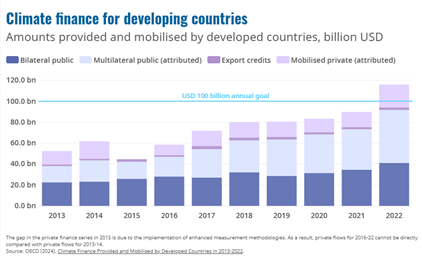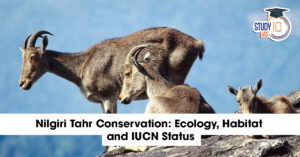COP29 at Baku: Climate Finance
- New Collective Quantified Goal (NCQG): The conference established a new climate finance goal to mobilise $300 billion annually by 2035 for developing countries.
- This figure represents a tripling of the previous commitment of $100 billion set in 2009.
- The overarching aim is to reach $1.3 trillion per year by 2035, combining public and private sources to effectively address climate impacts in developing nations.
- Carbon Markets: COP29 achieved agreements on carbon markets, finalising all elements of the Paris Agreement related to this topic.
- This is expected to help countries implement their climate plans more efficiently and contribute to global emissions reduction efforts.
- Other Agreements: The conference also made strides in areas such as transparent climate reporting and adaptation strategies, launching initiatives like the Baku Adaptation Road Map.
| Finance to tackle Climate Change: Background |
|
Criticism by Developing Countries
- Inadequate Financial Commitments: Developing nations criticised the $300 billion base target as insufficient to address their climate mitigation and adaptation needs.
- India called the package “too little and too distant”, stressing that it falls short of the $1.3 trillion annual funding required.
- Failure to Meet Past Promises: Developed countries have not fulfilled the earlier promise of mobilising $100 billion annually by 2020. This undermines trust in the new commitments.

- Exclusion and Lack of Transparency: India alleged that its request to speak before the adoption of the climate finance package was ignored, accusing the process of being “stage-managed”.
- Geopolitical Dominance: Critics, including Nigeria and Bolivia, argued that the NCQG was shaped by geopolitical interests of developed nations, ignoring the pressing needs of vulnerable countries.
- Delayed Action: The financial mobilisation goal is set for 2035, which developing countries see as too distant given the urgency of the climate crisis.
- Limited Progress on Trust and Collaboration: India and others emphasised that trust and collaboration—key to addressing climate change—were lacking in the negotiations, leading to widespread dissatisfaction.


 Graphic Processing Units (GPUs) – Work...
Graphic Processing Units (GPUs) – Work...
 Gold Imports and the Indian Economy – ...
Gold Imports and the Indian Economy – ...
 Nilgiri Tahr Conservation: Ecology, Habi...
Nilgiri Tahr Conservation: Ecology, Habi...




















